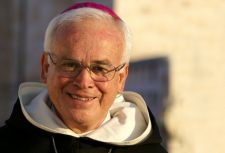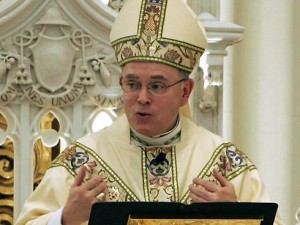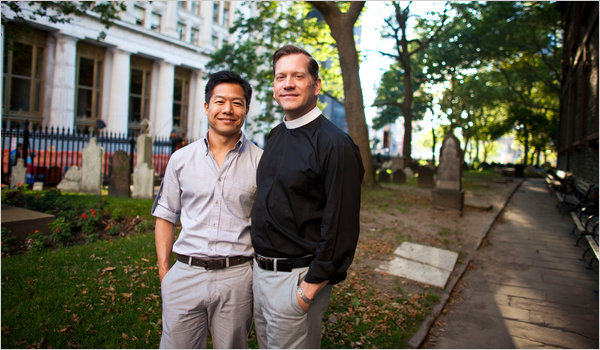Pro-gay bishop under fire
An unidentified group of people hung blankets on the railing that surrounds the Cathedral of Saltillo, Mexico with a message for Bishop Raul Vera Lopez: “We want a Catholic bishop.”
Employees at the Cathedral of Saltillo said they do not know who hung up the blankets or who took them down. “We don’t have them, and nobody here took them down,” said one employee.
According to the Mexican daily Vanguardia, the bishop chose not to respond to the July 12 protests against his leadership in the Diocese of Saltillo, where he has promoted and supported the San Elredo homosexual community, despite its positions that are at odds with Church teaching on homosexuality.
The diocese’s office of communications said Bishop Vega may issue a statement once he has been fully informed of the incident.
In June of this year, Noe Ruiz, the coordinator of San Elredo, said the group planned to ask newly elected local officials in the State of Coahuila to establish policies that respect homosexuals.
Ruiz added that his group planned to propose that same-sex couples be allowed to adopt and receive social security benefits, and that civil unions between them be called “marriage.”
The Diocese of Saltillo
In March of this year, Bishop Vera published a statement on the diocesan website expressing support for the “sexual, family and religious diversity forum.”
The event was aimed at “eradicating what some sectors of the Church believe about homosexuality” — especially the belief “that homosexual actions are contrary to God.”
Ruiz told CNA the purpose of the forum was to show that “two men or two women can raise a child and live normally like everyone else.”
Pro-family groups in Saltillo, such as the Familias Mundi Association, disagreed with that argument.
“We do not agree with forming same-sex families because families come from marriage, and marriage is a vocation that occurs between two people of the opposite sex who complement one another.”
CNA also interviewed Fr. Leopoldo Sanchez, who until a few months ago was the spiritual director for Courage Latino in Mexico, a ministry for homosexuals who wish to live according to the Church’s teachings.
“The Church reminds us that the right path is the path of love, a love that is lived in chastity, and absolutely all Christians are called to this, regardless of whether they have same-sex attraction or not,” he said.
True to Episcopal Church’s Past, Bishops Split on Gay Weddings
The Episcopal Church, which has been strained by gay-rights issues since the election of an openly gay bishop in New Hampshire eight years ago, is now divided over how to respond to the legalization of same-sex marriage in New York.
Related
Bishop Lawrence C. Provenzano will let priests in Brooklyn, Queens and on Long Island officiate at same-sex weddings. In some other New York dioceses, bishops will not or are undecided.
As a result, gay and lesbian Episcopalians will be allowed on Sunday to get married by priests in Brooklyn and Queens, but not in the Bronx or Manhattan or on Staten Island; in Syracuse but not in Albany.
That is because the church has not taken a firm position nationally on same-sex marriage, leaving local bishops with wide latitude to decide what priests may do when the law takes effect in New York State. In the state, with six Episcopal dioceses, the bishops are split: two have given the green light for priests to officiate at same-sex marriages, one has said absolutely not, two are undecided and one has staked out a middle ground, allowing priests to bless, but not officiate at, weddings of gay men and lesbians.
The Episcopal Church, known as one of the most welcoming to gay men and lesbians among mainline Protestant denominations, finds itself in an uneasy position on the issue — embracing neither the clear stance against same-sex marriage taken by Roman Catholic, evangelical Protestant, Muslim, Mormon and Orthodox Jewish leaders, nor the supportive position of Reform Jewish, Unitarian Universalist and many liberal Protestant leaders. The Episcopal Church is a small denomination — the church claims 172,623 members in New York State — but is also prestigious and influential.
Now, gay and lesbian Episcopalians are finding their joy at the legalization of same-sex marriage tempered by the ambiguity over where they stand in their church.
“The Episcopal Church should really communicate that God loves everybody,” said Roy Kim, 40, who is engaged to an Episcopal priest, the Rev. Clayton Crawley. “The Episcopal Church does do that better than most churches, but it’s a great opportunity now to really, unequivocally say that.”
He and Father Crawley worship at St. Paul’s Chapel, which is part of Trinity Wall Street in Lower Manhattan. In keeping with the local bishop’s directive, Trinity’s priests will not officiate at same-sex marriages, and the parish has not decided whether to allow them to bless such unions.
The Episcopal Church’s rules define marriage as a “union of a man and a woman” but also say the clergy must “conform to the laws of the state” governing marriage. In 2009, the denomination approved a resolution saying that “bishops, particularly those in dioceses within civil jurisdictions where same-gender marriage, civil unions or domestic partnerships are legal, may provide generous pastoral response to meet the needs of members of this church.”
But New York State’s bishops differ over just what a “generous pastoral response” means, and even the bishops most supportive of gay rights are struggling to balance their desire to sanctify the relationships of all of their parishioners with their reluctance to further alienate conservative Anglicans in Africa and even the United States.
The bishops of the Long Island and Central New York Dioceses have authorized priests to preside at same-sex weddings; the bishop of the New York Diocese (which includes three of the city’s five boroughs) is allowing them to bless but not officiate at such rites; the bishop of the Albany Diocese is barring any involvement by priests; and the bishops of the Rochester and Western New York Dioceses remain undeclared.
“It could appear to someone looking from outside the church that this is all we’re talking about, and it isn’t,” said Bishop Lawrence C. Provenzano of the Long Island Diocese. “It finds its place in the larger question of how you minister to the wider world.”
Bishop Provenzano, whose diocese includes Brooklyn and Queens, concluded that a “generous response” allowed presiding over the marriage rite. But Bishop Mark S. Sisk of the New York Diocese found that the “generous response” resolution did not supersede the canon law defining marriage.
“The landscape regarding marriage is still changing across the country, within the church and for gay or lesbian couples themselves,” Bishop Sisk, who supported the legalization of same-sex marriage, said in an interview conducted by e-mail. “The church is still in the process of creating liturgies for these rites and incorporating them into church law.”
A number of gay Episcopalians professed sympathy for what they viewed as Bishop Sisk’s effort to balance competing views.
“That’s a fair middle-of-the road-position,” said Mary O’Shaughnessy, coordinator of the New York metropolitan area chapter of Integrity USA, which advocates equal treatment for gay men and lesbians in the Episcopal Church. “There is nothing that I will call homophobic about that.”
Derek Baker, 46, also expressed understanding for Bishop Sisk’s predicament.
“He’s between a very pointy rock and a very firm hard place,” said Mr. Baker, who plans to have his marriage blessed at the Church of the Ascension in Greenwich Village, where he has been a parishioner for two decades.
The situation is particularly awkward for gay priests like Father Crawley. Bishop Sisk has said that gay and lesbian priests “living in committed relationships” should marry — even though they cannot do so in church.
“That’s called hypocrisy,” said the Rev. Michael W. Hopkins, rector of the Church of St. Luke & St. Simon Cyrene in Rochester. Father Hopkins is a past president of Integrity USA.
But Bishop Sisk responded, “The expectation that clergy in relationships will marry is not a demand, nor does it come with a specific timeline.” He also said clergy members could be creative in fashioning liturgies that might include a civil marriage conducted in the church but solemnized by a secular official, followed by a pastoral blessing offered by a priest.
Some gay and lesbian Episcopalians said they were content to allow the church to proceed slowly because they believed it was moving in what they viewed as the right direction. The issue of same-sex marriage will most likely be raised again at the church’s next national conference, next summer.
“The bishop might be completely behind gay marriage, but he also understands that unless we have the conversation, and unless we are patient, the church will break,” said Javier Galitó-Cava, a gay Episcopalian and actor who worships at St. Paul’s. “I want to kick and scream and say ‘How dare you, I’m not a second class citizen’ — but if I want this to happen, for myself and for my children, we have to take it one step at a time.”
New Archbishop: Gay Marriage Stops Kids From Knowing Parents Love Them
The man who will become the new Archbishop of Philadelphia in September, Charles Chaput, came out swinging against same-sex marriage equality today, suggesting that marriage between persons of the same gender is wrong because children need to know that their parents love them, and, somehow, same-sex marriage denies children the knowledge that their parents love them. Chaput, the first Native American Archbishop, is heralded as an intellectual Evangelical leader. Chaput’s predecessor, Justin Rigali, and his predecessor, Anthony Bevilacqua have both been accused by a grand jury of covering up sexual abuse.
“As children, if we don’t know that our parents love one another, our lives are very unstable. That’s why I think every child deserves a family where the father loves the mother, and the mother loves the father,” Chaput says, illogically, regarding same-sex marriage. If a child grows up with two fathers or two mothers, how will they not know they are loved by their parents? Typical religious attempt to de-legimitize same-sex headed households.
“This is the issue of our time,” Chaput adds, speaking of “gay marriage,” in an interview published today in the National Catholic Reporter. “The church understands marriage as a unique relationship, with a unique definition, which is the faithful love of a man and a woman for each other, permanent, and for the sake of children. As children, if we don’t know that our parents love one another, our lives are very unstable. That’s why I think every child deserves a family where the father loves the mother, and the mother loves the father. For us to redefine marriage as anything else undermines that notion. I think it’s very important that the church keep insisting on this.
“It’s also important to say that we’re not against gay people” Chaput says, towing the new line of religious rhetoric. Saying “we’re not against gay people,” while trying to de-legimitize everything we do, including our relationships and our families, is ludicrous.
“What we’re doing here is promoting marriage and the meaning of marriage, not condemning others. The church does believe that human sexuality has a meaning in itself, that it’s about love and procreation. Any other sexual relationship is contrary to the Gospel, and so a relationship between two people of the same sex is not in line with the teachings of the church and the teachings of the Gospel, and is therefore wrong. That said, we should always respect people who do things contrary to the Gospel. We live in a society where different ways of life are accepted by the general community, and it’s important for us to live in a way that’s not hostile to people.
“We have a duty as Catholics, however, to speak clearly about God’s plan for human happiness. Part of that plan is traditional, faithful, Catholic/Christian marriage.”
Once again, the Catholic Church is in direct contradiction with its congregants.
Vatican official: UN gay ‘rights’ agenda endangers Church’s freedom
The Vatican’s representative to the United Nations Human Rights Council in Geneva says a recent resolution on “sexual orientation and gender identity” is part of an agenda that could restrict the Church’s freedom.
“The resolution marks a change. It is seen as the beginning of a movement within the international community and the United Nations to insert gay rights in the global human rights agenda,” said Archbishop Silvano Tomasi, head of the Holy See’s Permanent Mission to the U.N. in Geneva, in a recent e-mail interview with CNA.
The archbishop noted that a U.S. State Department spokesperson had described the resolution as “a beginning of an international norm that will take hold gradually.” But “if norms are established,” Archbishop Tomasi wondered, “what provisions will be made for freedom of expression on the part of religious leaders?”
He spoke of a “genuine concern” that natural marriages and families “will be socially downgraded with the eventual legislation that puts homosexual “marriage” and the marriage between a man and a woman” on the same level. The Vatican representative also said marriage could be threatened by related measures that would mandate homosexual adoptions and introduce “compulsory sex education at school that clashes with Christian values.”
At a June 27 event co-hosted by the U.S. State Department and the Gays and Lesbians in Foreign Affairs Agencies organization, Secretary of State Hilary Clinton credited a “major push by American diplomats” for the June 17 passage of what she described as “the first ever U.N. resolution recognizing the human rights of LGBT (Lesbian, Gay, Bisexual and Transgender) people worldwide.”
Clinton called the resolution a “huge step forward,” and stated that “so far as the United States is concerned and our foreign policy, and our values … gay rights are human rights and human rights are gay rights.”
The resolution, which expresses “grave concern at acts of violence and discrimination … against individuals because of their sexual orientation and gender identity,” will not have an immediate effect on U.N. member states. Instead, it formally requests that the High Commissioner for Human Rights undertake an investigation into such acts, in preparation for further dialogue at the council during 2012.
Although the resolution will do little in the short term, the secretary of state described its passage – over the objections of numerous Arab and African counties, as well as Russia and Moldova – as one of the department’s “momentous achievements” on a matter of “high priority.”
In his remarks to CNA, Archbishop Tomasi reiterated that the Church does not support violence against those who engage in homosexual behavior, or any attempt by the state to punish an individual simply because of “feelings and thoughts.”
“I think that violence against homosexual persons is not acceptable and it should be rejected, even though this does not imply an endorsement of their behavior.”
“The terms ‘sexual orientation and gender identity’ are not defined in international law,” he noted.
“To the extent that they are not external behavior, but feelings and thoughts, they cannot be subjected to punitive laws.”
But “for some people,” he pointed out, “these words are a code phrase for types of conduct.”
The archbishop expanded on a point he has previously tried to impress upon the Human Rights Council, as he observed that all societies regulate sexual behavior to some extent – by forbidding practices like incest, pedophilia, or rape – for the sake of the common good.
He contrasted the “clear message” of God’s creation, which spells out the complementarity of the two sexes, with the U.N.’s contrived and vague terminology of “orientation” and “gender identity.”
“Instead of ‘gender,’” Archbishop Tomasi said, “the concept we should use is ‘sex,’ a universal term in natural law referring to male and female.”
“In fact, it seems that terms such as ‘gender’ or ‘sexual orientation’ are devised to escape reality and to accommodate a variety of feelings and impulses that then are transformed into rights.”
This use of “rights” language, to justify practices like same-sex “marriage,” may appear superficially harmless as long as the alleged rights seem to be confined to private life.
But Archbishop Tomasi warned that these impulse-driven claims of “rights” are in conflict with authentic rights – such as the free exercise of religion, and the education of one’s children.
He pointed to the “traditionally Catholic country” of Spain, as “an example of where the current trend may lead.”
In that country, “legislation has been passed in the last four or five years in favor of homosexual marriage, free abortion in the first 22 weeks of pregnancy, of compulsory education even for children aged 8 to 12 on such issues as masturbation, same-sex marriage, contraception and abortion.”
This arrangement prevails in Spain, “notwithstanding the fact that thousands of parents are opposing this policy that denies their fundamental right to decide on their children’s education.”
Archbishop Tomasi suggested that Catholics today have a responsibility “to clarify legal and moral aspects of the current culture” – by drawing a distinction between desires and rights, promoting the Catholic synthesis of faith and reason, and making it clear that a judgment against homosexuality is not a condemnation of homosexuals.
“There is confusion in some people’s mind,” he noted, “in combining a just respect and protection for every person – including homosexuals – and support for the indispensable role of the family, the parents right to educate their children, the support of the natural family for the common good.”
While the secular West may find this ethos increasingly incomprehensible, the Church will continues to promote it.
“The teaching of the Church is not conditioned by political consensus,” the archbishop noted.
“At times she is misunderstood and even becomes the target of reprisals and persecution.”
“Reason and natural law, however, support faith-inspired positions,” he stated, “and the convergence of faith and reason is exceptionally fruitful for the progress and well-being of the human family.”

